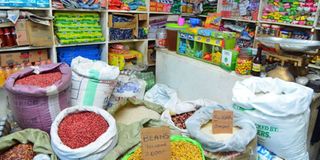Prime
Prices soar as Kenya hikes transport fares

Some of the prices of some consumer goods in a retail shop in Namuwongo, Kampala, on March 4, 2022. PHOTO/FRANK BAGUMA
What you need to know:
- The rising fuel costs led to the increase of transport fares, affecting commodity prices.
A recommendation by transport operators in Kenya to increase cargo transport rates by a minimum of 5 percent is likely to exacerbate the rising cost of commodities in Uganda.
President Museveni and ruling National Resistance Movement (NRM) legislators, yesterday caucused on the rising cost of commodities in the country while Parliament suspended a debate on the same on Tuesday.
On Monday, the Kenyan government through the Energy & Petroleum Regulatory Authority (EPRA) increased the pump prices for petrol and diesel by KShs5 per litre.
This prompted the advisory by the Kenya Transporters Association (KTA) to its more than 5,000 members to increase cargo transport rates by a minimum of 5 percent in order to sustain their businesses.
“KTA wishes to advise transporters countrywide to increase transport rates by a minimum of 5 percent to sustain their businesses under the current circumstances and to circumvent a total collapse of their ventures,” the statement reads in part.
The association’s chairperson, Mr Netwon Wang’oo, quoted in Kenya’s Standard Newspaper cited the rising cost of fuel insisting that the “margins can no longer sustain any increase in costs, and regrettably have to pass this increase to the cargo owners for the road transport sector to survive.”
A 20 feet container costs about $3,500 (Shs12.5m) to transport from Mombasa to Kampala.
Using this conservative estimate, the minimum recommendation would add about $175 (Shs625,000) on the cost of transporting the same container to Uganda. A business person would now have to pay Shs13.1m at the current dollar rate.
Kenya has increased its cost of petrol from an average of KShs129.72 (Shs4,068) to Ksh134.72 (Shs4,225) compared while diesel has jumped to Ksh115.60 (Shs3,625).
Uganda’s fuel pump prices have drastically gone up in the past six months and now threaten to double. Some major fuel dealers are increasing the price of petrol by almost Shs100 every day, with some stations now selling fuel at Shs5,260.
Less than a year ago, petrol was retailing at an average of Shs3,690
“Definitely transport costs are a key component in manufacturing. Any rise in the pricing in that chain means the cost incurred by the manufacturing is going to make the price of a commodity produced higher,” Mr Daniel Birungi, the executive director of Uganda Manufacturers Association (UMA), says.
Mr Birungi says the move is likely to compound on the already escalating costs of freight, which have risen by 50 to 80 percent while the shipping turnaround has doubled from about 90 days to 180 days.
This has forced manufacturers and other traders to factor the cost of the delay in the cost of their products. These costs are also compounded by paying for the raw materials in advance limiting the manufacturer’s cash flow. Also both the freighter and insurer demand their fees in advance.
“The new addition is not good given that this country is a net importer. Take for example the current international oil prices will be felt in Uganda in two months. We haven’t had the worst yet,” he says.
Mr Birungi says it is important that Uganda rationalises the tax element on fuel prices to cater for the tough times.
Way forward
Mr Daniel Birungi, the executive director of Uganda Manufacturers Association (UMA), says Uganda has relied heavily on the Kenya route for its oil imports and it is time the country diversified.
“In Kenya they operate a single buyer model which means dealers bid and the one with the highest bid takes the day which is not the case in Tanzania. It is time we utilised the Tanzania route via Lake Victoria,” Mr Birungi says.
He adds that there is need to leverage the capacity of Uganda Railways Corporation to bring in more fuel at affordable costs by exempting the corporation from the 30 percent tax levied on diesel.
READ MORE




